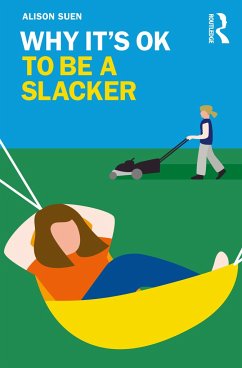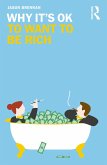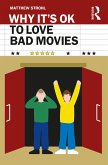"Stop slacking off!"
Your parents may have said this to you when you were deep into a video-gaming marathon. Or maybe your roommate said it to you when you were lounging on the couch scrolling through Instagram. You may have even said it to yourself on days you did nothing. But what is so bad about slacking? Could it be that there's nothing bad about not making yourself useful?
Against our hyper-productivity culture, Alison Suen critically interrogates our disapproval of slackers-individuals who do the bare minimum just to get by. She offers a taxonomy of slackers, analyzes common objections to slacking, and argues that each of these objections either fails or carries problematic assumptions. But while this book defends slacking, it does not promote the slacker lifestyle as the key to something better (such as cultural advancement and self-actualization), as some pro-leisure scholars have argued. In fact, Suen argues that slacking is unique precisely because it serves no noble cause. Slacking is neither a deliberate protest to social ills nor is it a path to autonomy. Slackers just slack. By examining the culture of hyper-productivity, Suen argues that it is in fact OK to be a slacker.
Key Features
Demonstrates the uniqueness of slacking, via a critical examination of six distinct "pro-leisure" philosophical accounts.
Articulates a taxonomy of slackers, as well as in-depth examinations of Hollywood slackers and slackers in academia.
Examines common objections to slacking (like the freeloading problem), and offers a rebuttal to each of them.
Offers an understanding of our productivity culture from an existential perspective.
Your parents may have said this to you when you were deep into a video-gaming marathon. Or maybe your roommate said it to you when you were lounging on the couch scrolling through Instagram. You may have even said it to yourself on days you did nothing. But what is so bad about slacking? Could it be that there's nothing bad about not making yourself useful?
Against our hyper-productivity culture, Alison Suen critically interrogates our disapproval of slackers-individuals who do the bare minimum just to get by. She offers a taxonomy of slackers, analyzes common objections to slacking, and argues that each of these objections either fails or carries problematic assumptions. But while this book defends slacking, it does not promote the slacker lifestyle as the key to something better (such as cultural advancement and self-actualization), as some pro-leisure scholars have argued. In fact, Suen argues that slacking is unique precisely because it serves no noble cause. Slacking is neither a deliberate protest to social ills nor is it a path to autonomy. Slackers just slack. By examining the culture of hyper-productivity, Suen argues that it is in fact OK to be a slacker.
Key Features
Demonstrates the uniqueness of slacking, via a critical examination of six distinct "pro-leisure" philosophical accounts.
Articulates a taxonomy of slackers, as well as in-depth examinations of Hollywood slackers and slackers in academia.
Examines common objections to slacking (like the freeloading problem), and offers a rebuttal to each of them.
Offers an understanding of our productivity culture from an existential perspective.
"Alison Suen's brilliant treatise on slacking is the best philosophy book I've read in a long time. Highly original, wickedly funny, wonderfully insightful, and full of gems, this little book delves into what it takes to be a slacker. Staying true to what she sees as the essential purposelessness and indifference of slacking, Suen concludes that it's okay-but just okay-to be a slacker. The last chapter on pandemic slacking then and now (1918 Spanish Flu and Coronavirus) is dazzling. Treat yourself to Why It's OK to be a Slacker, a thoroughly enjoyable and deeply thoughtful read."
Kelly Oliver, Vanderbilt University
"Why It's OK to Be a Slacker is a true pleasure to read! I had no idea that slacking could be such a philosophically fascinating topic before reading this book. Written in her characteristically witty and incisive prose, Suen's taxonomy of true and pseudo slackers is brilliant and entertaining, with particular attention to the profiles of academic slackers. Her defense, without endorsement, of the right to slack is equally original and compelling. Timely and distinct from the philosophical literature on leisure, Suen's book analyzes the most contemporary methods of apathetic under-achieving, and concludes with a chapter on slackerdom during Covid-19."
Chloë Taylor, University of Alberta
"Few characters are more maligned today than the slacker. In a culture where we define ourselves by what we do and where productivity gurus have co-opted leisure itself, Suen demonstrates why we should give slacking a chance. In her lively, sharply argued book, she deftly analyzes the nature of slacking, explains why many of our misgivings against slackers are misconceived, and invites us to see the slacker without a cause in a new light."
Alex Sager, Portland State University
"Why It's OK to Be a Slacker is well argued and highly entertaining. At a time when we are obsessed with conventional metrics of success and productivity, Suen's arguments on why slacking is acceptable provide interesting and useful balance."
Emily Esfahani Smith, author of The Power of Meaning
Kelly Oliver, Vanderbilt University
"Why It's OK to Be a Slacker is a true pleasure to read! I had no idea that slacking could be such a philosophically fascinating topic before reading this book. Written in her characteristically witty and incisive prose, Suen's taxonomy of true and pseudo slackers is brilliant and entertaining, with particular attention to the profiles of academic slackers. Her defense, without endorsement, of the right to slack is equally original and compelling. Timely and distinct from the philosophical literature on leisure, Suen's book analyzes the most contemporary methods of apathetic under-achieving, and concludes with a chapter on slackerdom during Covid-19."
Chloë Taylor, University of Alberta
"Few characters are more maligned today than the slacker. In a culture where we define ourselves by what we do and where productivity gurus have co-opted leisure itself, Suen demonstrates why we should give slacking a chance. In her lively, sharply argued book, she deftly analyzes the nature of slacking, explains why many of our misgivings against slackers are misconceived, and invites us to see the slacker without a cause in a new light."
Alex Sager, Portland State University
"Why It's OK to Be a Slacker is well argued and highly entertaining. At a time when we are obsessed with conventional metrics of success and productivity, Suen's arguments on why slacking is acceptable provide interesting and useful balance."
Emily Esfahani Smith, author of The Power of Meaning









